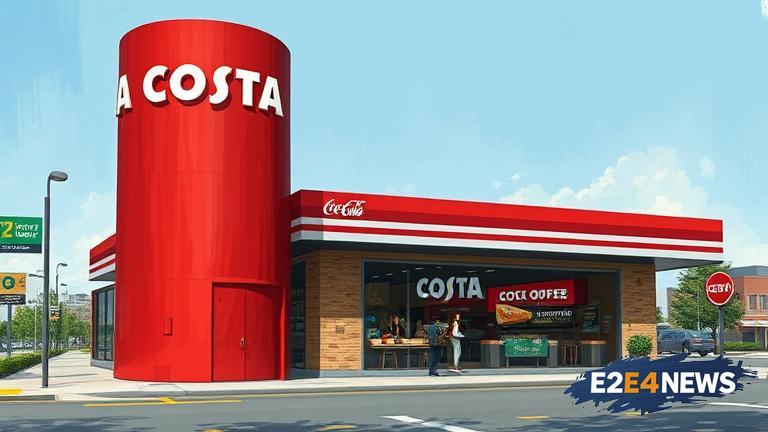Coca-Cola, the world’s largest beverage company, is exploring the sale of Costa Coffee, a leading coffee chain in the UK. The move is seen as a strategic decision to refocus on its core brands and operations. Costa Coffee, which was acquired by Coca-Cola in 2019 for $5.1 billion, has been a significant player in the UK coffee market. However, the company’s performance has been impacted by the COVID-19 pandemic, which has led to a decline in sales and profitability. As a result, Coca-Cola is reassessing its portfolio and considering the sale of non-core assets, including Costa Coffee. The potential sale of Costa Coffee is expected to attract interest from private equity firms and other strategic buyers. The coffee chain has a strong brand presence in the UK and a significant footprint, with over 4,000 stores across the country. Despite the challenges posed by the pandemic, Costa Coffee remains a popular brand, known for its high-quality coffee and convenient store locations. The sale of Costa Coffee would mark a significant shift in Coca-Cola’s business strategy, which has focused on expanding its presence in the coffee market in recent years. The company’s acquisition of Costa Coffee was seen as a move to diversify its portfolio and reduce its dependence on sugary drinks. However, the pandemic has forced Coca-Cola to reevaluate its priorities and focus on its core brands, including Coca-Cola, Fanta, and Sprite. The potential sale of Costa Coffee is also seen as a response to changing consumer trends, which have shifted towards healthier and more sustainable beverage options. As consumers become increasingly health-conscious, Coca-Cola is looking to adapt its portfolio to meet these changing demands. The company has already taken steps to reduce its sugar content and introduce new low- and no-sugar products. The sale of Costa Coffee would also provide Coca-Cola with an opportunity to focus on its digital transformation and e-commerce capabilities. The company has invested heavily in digital technologies, including mobile ordering and delivery, to enhance the customer experience and improve operational efficiency. In addition to the potential sale of Costa Coffee, Coca-Cola is also exploring other strategic options, including partnerships and collaborations with other companies. The company has already formed partnerships with companies such as McDonald’s and Starbucks to expand its reach and improve its offerings. As the beverage industry continues to evolve, Coca-Cola is looking to stay ahead of the curve and adapt to changing consumer trends and preferences. The potential sale of Costa Coffee is just one example of the company’s efforts to refocus its operations and prioritize its core brands. With a strong brand portfolio and a commitment to innovation and digital transformation, Coca-Cola is well-positioned to navigate the challenges and opportunities of the beverage industry. The company’s decision to explore the sale of Costa Coffee is a strategic move that reflects its commitment to creating long-term value for shareholders and customers. As the company looks to the future, it is clear that Coca-Cola will continue to be a major player in the beverage industry, with a focus on core brands, digital transformation, and customer-centric innovation.
